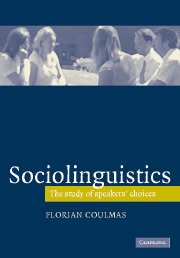Book contents
- Frontmatter
- Contents
- 1 Introduction: notions of language
- Part I Micro-choices
- Part II Macro-choices
- 7 Code-switching: linguistic choices across language boundaries
- 8 Diglossia and bilingualism: functional restrictions on language choice
- 9 Language spread, shift and maintenance: how groups choose their language
- 10 Language and identity: individual, social, national
- 11 Language planning: communication demands, public choice, utility
- 12 Select letters: a major divide
- 13 The language of choice
- Glossary of terms
- References
- Internet resources
- Index
- References
7 - Code-switching: linguistic choices across language boundaries
Published online by Cambridge University Press: 05 June 2012
- Frontmatter
- Contents
- 1 Introduction: notions of language
- Part I Micro-choices
- Part II Macro-choices
- 7 Code-switching: linguistic choices across language boundaries
- 8 Diglossia and bilingualism: functional restrictions on language choice
- 9 Language spread, shift and maintenance: how groups choose their language
- 10 Language and identity: individual, social, national
- 11 Language planning: communication demands, public choice, utility
- 12 Select letters: a major divide
- 13 The language of choice
- Glossary of terms
- References
- Internet resources
- Index
- References
Summary
In order to resume. Resume the – what is the word? What the wrong word?
Samuel Beckett, Ill Seen, Ill SaidThe speech which had started off one hundred percent in Ibo was now fifty-fifty. But his audience still seemed highly impressed. They liked good Ibo, but they also admired English.
Chinua Achebe, No Longer at EaseWhereas in the first part of the book we focused on linguistic choices concerning features of expressions and lower-level units of a language system, this part deals with higher-level choices in language-contact situations. In previous chapters it has become apparent how variation and choice render the notion that a language is a homogeneous, clearly delimited system untenable – be it as a naïve idea or a theoretical abstraction. Taking the notion of language as a social fact seriously forces us to reckon with variation in space and time, across social strata and determined by the speakers' sex and age, and to see in it not deviation or imperfection, but an essential prerequisite of using language to construct society.
So far, however, it was understood that we were dealing with choices among the varieties of one language. Only occasionally have we touched on linguistic choices that traverse the boundaries of a language. In chapter 6 we saw that stylistic diversity can be accomplished by incorporating elements of one language into another, and that politeness, a social variable, can determine the choice of a register or style.
- Type
- Chapter
- Information
- SociolinguisticsThe Study of Speakers' Choices, pp. 107 - 125Publisher: Cambridge University PressPrint publication year: 2005

